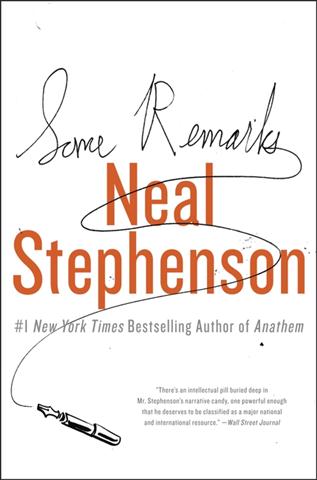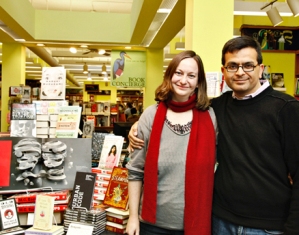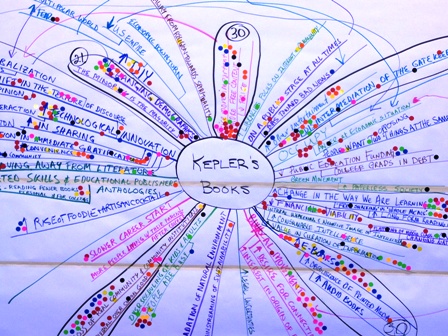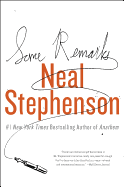 In 1996, when he was still best known for his "cyberpunk" breakthrough novel, Snow Crash, Neal Stephenson filed a book-length article for Wired recounting his journey through various Asian nations to Egypt to the shores of England to check out the installation of a new generation of fiberoptic cables through which the Internet's data would stream. It was less an act of journalism, he wrote, than a new genre he called hacker tourism: "travel to exotic locations in search of sights and sensations that would only be of interest to a geek," with regular reassuring of the experts encountered along the way that you really do want them to go deep into the specs. The result was a seemingly sprawling but actually quite tightly structured adventure story filled with precise technical details--a trademark style any fan of Stephenson's later novels would recognize.
In 1996, when he was still best known for his "cyberpunk" breakthrough novel, Snow Crash, Neal Stephenson filed a book-length article for Wired recounting his journey through various Asian nations to Egypt to the shores of England to check out the installation of a new generation of fiberoptic cables through which the Internet's data would stream. It was less an act of journalism, he wrote, than a new genre he called hacker tourism: "travel to exotic locations in search of sights and sensations that would only be of interest to a geek," with regular reassuring of the experts encountered along the way that you really do want them to go deep into the specs. The result was a seemingly sprawling but actually quite tightly structured adventure story filled with precise technical details--a trademark style any fan of Stephenson's later novels would recognize.
"Mother Earth, Mother Board" is by the far the longest item in Some Remarks, and though some readers might find the sheer amount of information overwhelming, it's a prime example of a quality in Stephenson's nonfiction that he himself identified in David Foster Wallace: "a touching, and for the most part well-founded, belief that you can explain anything with words if you work hard enough and show your readers sufficient respect." (That essay, which first appeared as an introduction to Wallace's meditation on infinity, Everything and More, effortlessly shifts gears from an autobiographical reflection of growing up, like Wallace, in a MACT--"Midwestern American College Town"--to a taxonomy of science books for general audiences, among other themes.)
The other pieces here include op-ed contributions, college lectures, interview transcripts and even a pair of early short stories. (Fans of Stephenson's 2011 novel Reamde may be intrigued to see that his interest in online role-playing networks as a platform for alternate currencies extends at least as far back as 1995's "The Great Simoleon Caper.") Topics range from the blind spot many secularists have when it comes to understanding religious faith to the need to reinfuse science fiction with visionary aspirations to the health risks of sitting at a computer all day. It's all shot through with a sly humor; as he says in response to an online fan's question comparing him with William Gibson, "his Praying Mantis style was no match for my Flying Cloud technique." Some Remarks is an easy slam dunk for Stephenson's existing fan base, but his dig-deep approach may appeal to literary nonfiction audiences as well. --Ron Hogan
Shelf Talker: Neal Stephenson's nonfiction is just as wonky and detail-oriented as his novels, with an open, welcoming voice that compares favorably to contemporaneous "literary" essay collections.
 Jonah Lehrer used a little too much imagination in writing Imagine: How Creativity Works, which was published in March: the book includes quotations attributed to Bob Dylan that Lehrer made up, were misquotations or combinations of other quotations, according to the New York Times. As a result, Lehrer has resigned as a staff writer at the New Yorker, and publisher Houghton Mifflin Harcourt has taken the e-book version of Imagine off the market, has halted shipping of the printed version and (as noted in an ad below, left) is asking all accounts to stop selling the book and return all copies for full credit, with freight paid for by HMH.
Jonah Lehrer used a little too much imagination in writing Imagine: How Creativity Works, which was published in March: the book includes quotations attributed to Bob Dylan that Lehrer made up, were misquotations or combinations of other quotations, according to the New York Times. As a result, Lehrer has resigned as a staff writer at the New Yorker, and publisher Houghton Mifflin Harcourt has taken the e-book version of Imagine off the market, has halted shipping of the printed version and (as noted in an ad below, left) is asking all accounts to stop selling the book and return all copies for full credit, with freight paid for by HMH.




SHELFAWARENESS.1222.S1.BESTADSWEBINAR.gif)




SHELFAWARENESS.1222.T1.BESTADSWEBINAR.gif)
 It's a small step, but Kathy Simoneaux told the Pottstown Mercury that
It's a small step, but Kathy Simoneaux told the Pottstown Mercury that  The aim, as Praveen Madan, co-owner of the Booksmith in San Francisco and leader of the
The aim, as Praveen Madan, co-owner of the Booksmith in San Francisco and leader of the 

 The store sold more than 800 copies of the book
The store sold more than 800 copies of the book "Does getting voted
"Does getting voted  James Howard Kunstler
James Howard Kunstler "Your purchase can make a big difference to this independently owned business in small-town upstate New York," Kunstler noted on his website.
"Your purchase can make a big difference to this independently owned business in small-town upstate New York," Kunstler noted on his website.
 Animals Don't, So I Won't!
Animals Don't, So I Won't!
 In 1996, when he was still best known for his "cyberpunk" breakthrough novel, Snow Crash, Neal Stephenson filed a book-length article for Wired recounting his journey through various Asian nations to Egypt to the shores of England to check out the installation of a new generation of fiberoptic cables through which the Internet's data would stream. It was less an act of journalism, he wrote, than a new genre he called hacker tourism: "travel to exotic locations in search of sights and sensations that would only be of interest to a geek," with regular reassuring of the experts encountered along the way that you really do want them to go deep into the specs. The result was a seemingly sprawling but actually quite tightly structured adventure story filled with precise technical details--a trademark style any fan of Stephenson's later novels would recognize.
In 1996, when he was still best known for his "cyberpunk" breakthrough novel, Snow Crash, Neal Stephenson filed a book-length article for Wired recounting his journey through various Asian nations to Egypt to the shores of England to check out the installation of a new generation of fiberoptic cables through which the Internet's data would stream. It was less an act of journalism, he wrote, than a new genre he called hacker tourism: "travel to exotic locations in search of sights and sensations that would only be of interest to a geek," with regular reassuring of the experts encountered along the way that you really do want them to go deep into the specs. The result was a seemingly sprawling but actually quite tightly structured adventure story filled with precise technical details--a trademark style any fan of Stephenson's later novels would recognize.